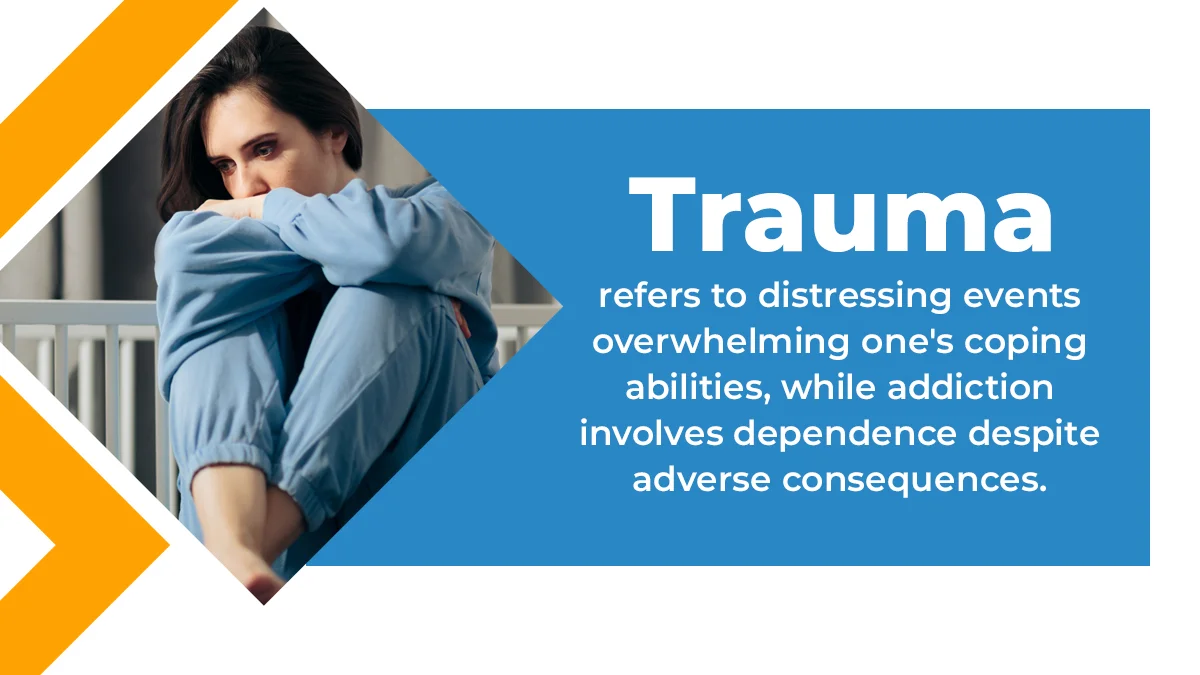
Lyrica With Suboxone: Risks And Safe Practices
The Recovery Team-Newton explores whether taking Lyrica with Suboxone is safe. Explore potential risks and guidelines

Trauma and addiction often intertwine, creating a complex cycle. Trauma refers to distressing events that overwhelm a person’s ability to cope. Addiction involves dependence on substances or behaviors despite adverse consequences. Addressing trauma alongside addiction helps individuals heal holistically and reduces the risk of relapse.
The intersection of trauma and addiction is a complex and intricate cycle that can be difficult to break free from. Here’s what you need to know:
The Recovery Team-Newton offers comprehensive support and personalized treatment programs for individuals struggling with addiction or mental health issues. Call us at (508) 978-2772 for more information.
Trauma is a distressing event or experience that overwhelms a person’s ability to cope. It can result from various situations, such as accidents, abuse, or natural disasters. Childhood traumas affect individuals emotionally, physically, and psychologically. Common responses include fear, anxiety, and flashbacks.
Trauma can disrupt daily life and relationships, leading to long-term effects if left untreated. It’s important to understand that trauma is subjective, meaning what one person finds traumatic, another might not.
Meanwhile, addiction is a condition where a person can’t stop doing something, even if it causes harm. It can involve substances (drugs or alcohol) or behaviors like gambling or gaming.
Addiction changes the brain, making it hard for people to control their actions. It often starts with pleasure but can turn into a compulsion. Over time, addiction can lead to severe problems in work, relationships, and health.
Trauma inflicts deep wounds on individuals, causing profound suffering and lasting impacts on their lives. Below are the short-term and long-term effects of trauma.
Trauma can have an immediate effect on a person’s well-being. These short-term effects may include intense fear, anxiety, and shock. People struggling with trauma may experience physical symptoms like headaches, nausea, and rapid heartbeat. They might also have trouble sleeping and eating.
Emotionally, they may feel overwhelmed, irritable, or numb. Concentration and memory can become tricky, affecting daily tasks. Relationships may suffer as individuals struggle to cope with their emotions. Seeking support from loved ones or experts is crucial during this time.
Trauma can also have lasting effects that persist over time. Long-term effects may include chronic stress, depression, and anxiety disorders. Physical health problems like heart disease and chronic pain can also develop.
Substance use disorders and addiction are expected long-term outcomes of trauma, as individuals may turn to substances to cope with their pain. Trauma can affect one’s self-esteem, leading to feelings of guilt, shame, and worthlessness. Relationships may continue to be strained, and social isolation can occur.
Trauma affects the brain by altering its structure and function. It can change areas responsible for memory, emotion, and stress response.
The amygdala, involved in processing emotions, becomes overactive, leading to heightened fear and anxiety. The hippocampus, responsible for memory formation, can shrink, impacting the ability to recall details of the traumatic event.
The prefrontal cortex, involved in decision-making and impulse control, may also be affected, leading to difficulties regulating emotions and behaviors. These changes can contribute to symptoms like flashbacks, hypervigilance, and emotional instability. Developing effective treatments and interventions for trauma requires an understanding of how it impacts the brain, which can support individuals in coping and healing from their experiences.
The connection between trauma and addiction runs deep, with traumatic experiences often leading individuals to seek solace in addictive substances or behaviors.
Trauma plays a significant role in the development of addiction. People who experience trauma may turn to substances or behaviors as a way to cope with their emotional pain. Trauma can make individuals more vulnerable to addiction by altering brain chemistry and increasing susceptibility to substance use.
Additionally, traumatic experiences can lead to feelings of distress and despair, further driving individuals towards addictive substances or behaviors as a means of escape.
Addiction can also lead to traumatic experiences. Substance abuse and addictive behaviors can result in dangerous situations, such as accidents, violence, or involvement with law enforcement. These experiences can further traumatize individuals and exacerbate their existing trauma. Additionally, addiction can strain relationships, leading to loss of support and isolation, which can also be traumatic.
Trauma comes in various forms, each with its unique impact on individuals.
Acute Trauma: results from a single distressing event, such as an accident, assault, or natural disaster. It can cause immediate emotional and physical distress.
Chronic Trauma: involves repeated exposure to distressing events over an extended period, such as ongoing abuse, neglect, or living in a war zone. It can have long-lasting effects on a person’s well-being.
Complex Trauma: occurs when individuals experience multiple traumatic events, often in interpersonal relationships, such as childhood abuse or neglect. It can lead to severe emotional and psychological difficulties.
Secondary Trauma: refers to the emotional toll experienced by individuals who witness or work closely with those who have experienced trauma, such as first responders, healthcare professionals, or caregivers. It can result in symptoms similar to those of primary trauma.
Different types of trauma can contribute to the development of addiction in various ways. Acute trauma may lead individuals to seek immediate relief from distressing emotions through substances or behaviors.
Chronic trauma, endured over time, can create a persistent need to escape or numb the pain, often resulting in substance abuse or addictive behaviors as coping mechanisms. Complex trauma, stemming from multiple traumatic experiences, can profoundly impact one’s sense of self and ability to regulate emotions, increasing vulnerability to addiction.
Secondary trauma experienced by caregivers or first responders may also lead to coping strategies involving substances or behaviors.
Experiencing trauma can leave lasting effects on individuals, manifesting in various signs and symptoms. These include:
Identifying these signs and symptoms is essential for identifying and supporting individuals affected by trauma.
Risk factors include both individual characteristics and environmental influences, contributing to the likelihood of experiencing traumatic events.
Individual risk factors for trauma include personal characteristics and experiences that increase susceptibility to traumatic events. These may consist of a history of abuse or neglect, mental health conditions like depression or anxiety, substance abuse, and genetic predispositions. Additionally, age, gender, and ethnicity can play a role in vulnerability to trauma.
Environmental risk factors involve external influences that contribute to the likelihood of experiencing trauma. These can include living in areas with high rates of violence or natural disasters, unstable living conditions, poverty, and exposure to ongoing stressors like discrimination or bullying. Family dynamics, such as dysfunctional relationships or lack of support, also contribute to environmental risk factors for trauma.
Certain traumatic experiences can increase the likelihood of developing specific addictions. For instance, people who have experienced physical or sexual abuse may turn to substances like alcohol or drugs to cope with their emotional pain.
Similarly, those who have endured neglect or abandonment may develop addictive behaviors such as gambling or compulsive shopping as a means of seeking comfort or control. Witnessing violence or being involved in accidents or natural disasters can also lead to substance abuse or addiction as individuals seek relief from distressing memories or emotions. By addressing the underlying trauma alongside addiction, individuals can work towards healing and recovery more effectively.
In addressing trauma and addiction, several treatment modalities prove effective. Therapy, counseling techniques, rehabilitation, and detoxification programs are pivotal in aiding individuals’ recovery.
Therapy and counseling play a vital role in treating trauma and addiction. Cognitive behavioral therapy (CBT) helps individuals recognize and change negative thought patterns and behaviors linked with trauma and addiction.
Eye movement desensitization and reprocessing (EMDR) effectively processes traumatic memories and reduces distress. Dialectical behavior therapy (DBT) teaches skills to manage emotions and improve relationships.
Various rehabilitation and detoxification programs are available to address addiction alongside trauma. Residential programs offer intensive treatment in a live-in setting, providing round-the-clock care and support. Outpatient programs allow individuals to receive treatment while living at home, attending therapy sessions and support groups regularly.
Medication-assisted treatment (MAT) combines medications with counseling and behavioral therapies to manage addiction and reduce cravings. These modalities help individuals overcome psychological trauma and addiction, promoting long-term recovery and improved quality of life in the United States.
For help with trauma and addiction in the United States, numerous resources are available. National helplines like SAMHSA’s National Helpline (1-800-662-HELP) offer confidential support and referrals to treatment services.
Local community mental health centers provide counseling and therapy options. Online platforms such as Psychology Today’s therapist directory help individuals find licensed therapists.
Non-profit organizations like NAMI (National Alliance on Mental Illness) offer support groups and educational resources. Additionally, healthcare providers can guide and assist in finding appropriate treatment options.
Trauma and addiction can cause turmoil, wreaking havoc on mental and emotional health. At The Recovery Team-Newton, we understand the profound impact these challenges can have on individuals’ lives.
Our day treatment program offers intensive therapy and support, empowering you to confront. With dual diagnosis treatment, we address both mental health and substance use disorders concurrently.
Through our outpatient program, access flexible care while maintaining your daily commitments. Our partial hospitalization program offers structured support while allowing you to return home in the evenings for a balance of treatment and independence.
Reclaim your life from the grips of trauma and addiction. Call us at (508) 978-2772 for lasting recovery.
Trauma, like abuse or assault, especially during childhood, can lead to mental health issues such as PTSD (post-traumatic stress disorder). This stress affects brain development, increasing the risk of addiction as a coping mechanism. Trauma history is strongly linked to substance abuse, particularly alcohol addiction.
When someone experiences trauma, they might turn to drugs to numb their emotions, forming a strong correlation between trauma and addiction. Trauma exposure triggers a flight response in the brain, pushing individuals toward addictive behaviors and highlighting the importance of addressing trauma in addiction recovery.
Trauma, like adverse childhood experiences, sexual assault, or emotional abuse, can lead to substance abuse and addiction. When a person undergoes such traumatic events, they may develop mental health problems and seek relief through drugs or alcohol.
Studies show survivors of childhood trauma have an increased risk of drug abuse. Trauma affects brain structure, especially in young people, leading to adverse effects.
Trauma-informed care acknowledges the link between trauma and addiction, helping individuals heal. Many turn to substances to self-medicate traumatic stress. Addressing trauma can lead to better outcomes in addiction recovery.

The Recovery Team-Newton explores whether taking Lyrica with Suboxone is safe. Explore potential risks and guidelines

Learn about Suboxone injection side effects and explore recovery solutions in this guide by The Recovery Team-Newton.